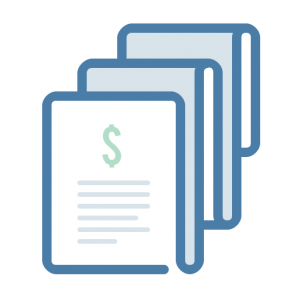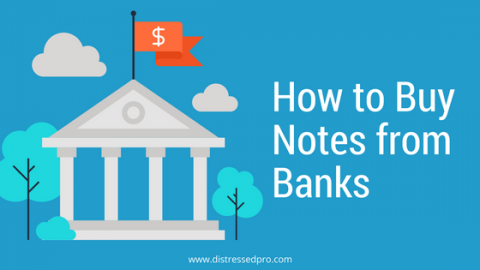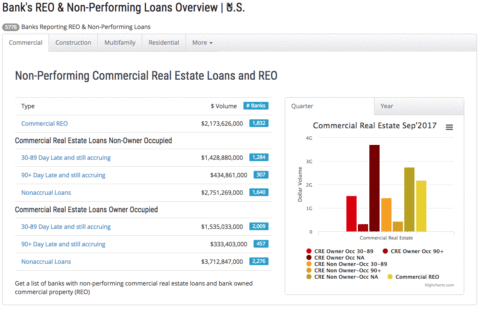If you’re looking into buying non-performing notes from banks, then you’ve probably heard that it can be hugely profitable.
And it can!
But the truth is that you need to know what you’re doing, or you’ll never get through the door.
Consider this article the primer to get you going in the right direction.
The actual mechanics of the note-buying process are largely the same whether you’re buying from a private seller or an institutional seller (like a bank), but it’s finding and signing the deal that varies, and that’s what we’re going to cover here.
Before we get started, you should understand that buying notes from banks requires more effort than buying notes from brokers, hedge funds, or marketplaces, but it also provides the best returns on your energy. If you focus on non-performing notes, you’ll have the most flexibility in strategy, offering an opportunity to maximize the profit in your deals.
In this guide, we’ll cover:
Here’s a video offering some expert insight into how to buy notes from banks. Keep scrolling and you’ll find more details on the buying process.
Why Do Banks Sell Notes?
Banks sell notes as a regular part of their business to recapitalize. Many banks originate loans (mortgages) with the intent to sell those loans into the secondary market. Fannie and the other mortgage-related government-sponsored enterprises (GSEs) exist for the sole purpose of buying these loans to float the housing market.
When a lender originates and funds a loan, they can take their profit and sell the note into the secondary market to get back their initial capital so that they can loan it out again.
But banks also sell non-performing, sub-performing, and non-conforming or “out of the box” loans for other reasons.
Here are four reasons banks sell non-performing notes:

1. To avoid unknown liabilities.
Sometimes a lender will have a non-performing note on an asset, like a gas station or an old factory where they don’t want to foreclose due to environmental contamination potential. A site could be clean, but the bank may choose to avoid a foreclosure if there’s a perceived liability.
Once a bank gets into the “chain of title,†they risk future litigation. A smart (and litigious) person goes after “the money.” Obviously, that’s the bank.
2. To avoid high legal costs and long foreclosure processes.
Different municipalities have different foreclosure laws. If a bank has a pool of non-performing loans in an area where a long, drawn-out foreclosure process is likely, they might deem selling the note is more advantageous.
3. Banks don’t always have the same flexibility and workout options as private investors.
Banks don’t always have flexibility on loan workouts. Banks are highly regulated, which means that “the box†within which they must work to “rehab†or restructure a loan is not as malleable as that of a private investor or fund.
4. Selling non-performing loans is faster and cheaper than foreclosing on and selling REO.
A bank can sell and close on a non-performing loan sale in under a month. They’re able to refill their coffers and eliminate working-hours, legal fees, compliance costs, and months of effort.
Consider what’s involved in foreclosing on a property, beginning with “booking it in†(repurchasing the note at auction), listing it, and selling it.
- Legal fees for notices
- Auction fees
- Property preservation costs
- Municipal compliance costs
- Realtor fees
- Market price risks
- Vandalism
The list goes on.
Once a bank adds up all the costs and time required to deal with foreclosing on numerous non-performing loans, simply selling the notes seems like the most cost-effective, expeditious option.
What Kinds of Mortgage Notes do Banks Sell?
Banks sell various note types. A note, also known as a promissory note, is a legally binding, written promise that outlines a loan’s repayment terms and timelines. Payment histories typically determine a note’s status. The primary statuses are:
- Performing Note: A note that’s consistently repaid according to loan terms
- Non-Performing Note: A note that hasn’t been repaid according to loan terms for 30-90 days
- Sub-Performing Note: A note that’s on the path to non-performing, usually delinquent by 29-60 days.
- Non-Conforming Note: A note with terms that are unconventional or un-insurable by government programs like the VA or FHA.
Most of the notes banks sell fall under the non-performing or sub-performing categories since notes in these statuses cost the bank money. However, performing notes are occasionally available, too.
What’s the Difference between a Performing and Non-Performing Note?
From a note investing standpoint, the difference lies in lender repayment expectations and risk. If a borrower consistently pays according to loan terms, lenders have minimal motivation to sell it.
However, once a performing note hits a non-performing status and repayment expectations dwindle, the note becomes a lender liability. Banks will make plans to recoup the loan balance by either selling the note or foreclosing on the property tied to the note.
How Do I Know Which Banks are Selling Mortgage Notes?

Identify note sellers by starting with local and regional lenders. Thousands of banks and credit unions sell notes throughout the U.S., but long-term note buying success usually involves doing business with lenders near you.
Finding banks with non-performing notes for sale requires research and efficient, effective communication.
Since there isn’t a centralized list of banks selling notes, you may need to check a few sources for prospects. Top bank prospecting tools include:
1. Free Public Data Sources
Financial regulatory agencies keep reports on banks and credit unions that provide excellent insight into financial institutions’ portfolios. When you use these free sources, you’ll have access to spreadsheets and documents tracking non-performing note volume and other important note-related details that’ll help you determine which banks are worth pursuing.
- Federal Deposit Insurance Corporation (FDIC)
- Federal Financial Institutions Examination Council (FFIEC)
- National Credit Union Association (NCUA)
You may have to dig a little to get all of the information you need, so expect this process to take a little time.
2. BankProspector Software
You can save time and effort during the lender search by utilizing a tool like BankProspector. The software keeps real-time information on:
- Late/non-performing loans
- Note portfolios by asset type
- Lenders’ non-performing assets and pipeline
- Holding loans
- Non-performing notes sale histories
By assessing these various details, you can zero in on the best places to buy notes.
Here are some clues to help you speed up your search:
Banks report a couple of indicators that offer insight into what’s happening in their portfolios and what motivation levels they might have to sell. The key indicators that we look at are:
- Non-Accrual Loans Sold – Banks report the non-accrual loans that they sell throughout the quarter. Banks that have a history of selling non-accrual are more likely to sell in the future.
- Late and Non-Accrual Loans Held for Sale – Banks report the total volume of delinquent and non-accrual loans that they’re holding specifically in a “bucket†for sale.
We consider other indicators, like the non-performing loans-to-loans ratio, whether or not they’re taking charge-offs, and more. You can go more in-depth on this with our free webinar training, or if you’re really serious, check out the Academy.
Who Do I Contact at the Bank to Buy Mortgage Notes?
To buy a note from a bank, you need to establish contact with the person who handles the transactions, aka the decision-maker. Decision-maker titles vary from bank to bank, primarily driven by bank size and note asset type.
Smaller banks could have decision-makers all the way up to the president involved in certain non-performing note sales. A local bank is a small business and operates like one, with decision-makers, processes, meetings, and lots of staff involved.
Larger banks often have secondary marketing desks or workout officers who handle note sales, though senior management members sometimes make the deals.
You can find decision-maker contact information through various sources, including:
- Lender’s website
- Data.com – a continually updated, crowd-sourced database of hundreds of thousands of contacts
- LinkedIn – if used properly, can help you identify and contact real decision-makers
- Professional organizations like TMA, ABI, and local banking groups
BankProspector takes the guesswork out of identifying the right person to contact. Our subscribers can easily access 79,958 bank contacts. Our full-time contact managers constantly monitor and update employee names and contact details so when you need the right number or email address, it’s there.
Build your contact list, prepare your script, and research lender details before reaching out to decision-makers.
How to Contact Bank Decision-Makers
Deals get done between people. Once you’ve identified your contact at the bank, it’s time to connect. There are three ways to communicate with banks selling notes.
By Phone
Phone calls allow you to make a clear and personalized connection with a decision-maker. Unlike written contact methods, you can easily confirm whether you’ve connected with your contact.
When you start calling banks for non-performing notes:
- Call as high up in the organization as you feel is reasonable. At big banks, you obviously won’t be talking to the president. At smaller banks, you will. Wherever you’re calling – call as high up as seems reasonable.
- Call with a name. Don’t call in and ask for the person in charge. This technique shows that you have no idea what you’re doing. You’ll get endless voicemail at best. Do your research upfront to get a name, an email, and hopefully, a direct line for the person you suspect is the decision-maker.
By Email
Emailing bank contacts is an efficient way to introduce yourself and keep communications organized. However, it can be challenging to break through and get the conversation started.
When you cold-email banks or initiate contact for the first time, how you convey your message is critical. Briefly introduce yourself, explain what you do, and how it benefits the bank. Remain professional yet friendly and stick to the point.
On LinkedIn
Some bank contacts are accessible via professional social media platforms like LinkedIn. The passive approach won’t get you very far, though.
Being on the platform and presenting yourself as a note investor on your profile and in groups is helpful. However, to get a bank note seller’s attention on LinkedIn, you’ll have to contact them directly. This method is similar to emailing – make sure you’re concise, and explain who you are and what you do.
What to Expect in a Transaction when Buying Notes from a Bank
There are lots of different ways that a transaction can come together, but the indicative bid process is most common. In this scenario, you are given some information about the asset, at which time you make an indicative bid.
An indicative bid is typically subject to a fast-moving due-diligence period. Frequently you will make your indicative bid in the form of a Letter of Intent (LOI). Sometimes you will put down a binder, also known as a good faith deposit or escrow.
When buying notes from the bank, you can expect:
- Attorneys to be very involved in the process.
- Your transaction to require approval by a committee.
- To await approval from multiple decision-makers. This aspect varies depending on the size of the bank that you’re pursuing and the size of the deal. However, some bank note sales only go through one or two people.
Generally speaking, when you start a note purchase with a bank, you want to put your best foot forward. This isn’t to say that you can’t negotiate, but re-trades (re-negotiating) are generally frowned upon. If you’ve gone through your initial diligence and are coming to a close and you look for a re-trade, you can expect real pushback and the possibility that you won’t do business with that lender again.

Transaction timeframes are typically sensitive when you’re dealing with banks. This is partially due to their quarterly reporting cadence. Be prepared to move swiftly and communicate regularly during the purchase process.
When buying notes from local banks, you may find that it’s easier to speak directly with the decision-maker and that the bidding process is less demanding. When you buy a note from a big bank, you can expect the notifying process to be more opaque and exclusive.
How to Get Started with Buying Bank Direct Mortgage Notes
The best way to get started with buying notes direct from banks is to focus on finding the deals.
Frequently we hear from people who want to get started in note buying but are concerned that they are only able to invest a small amount. We hear “can I buy just one note?” quite frequently. However, buying one note isn’t the best way to invest in this industry.
Think about it this way. First, you want to find the product, so start by finding banks that are selling notes. Don’t worry about how you’re going to “take down these deals.” There’s so much capital in chasing these kinds of deals; finding them is the most important and highest value part of the job.
3 Steps to Start Buying Bank Direct Mortgage Notes
- Identify which banks are the best prospects.
- Determine those banks’ decision-makers.
- Establish regular communication with those decision-makers so that you are there when transactions start happening.
We cover these steps and their components in-depth in our free training webinar and our BankProspector software provides the prospect information including the list of banks and credit unions as well as decision-makers and their contact info.
Some of the banks you call today will have notes that they are looking to sell. The vast majority of them won’t have something on their desk today but they might next week, next month, next quarter, or even next year. Unless you’re a very short-term buyer, you can see how it makes sense to have a system of communication that keeps you in touch.
FAQs
What Kinds of Non-Performing Notes Will Banks Sell?
Banks sell all kinds of non-performing notes. The most successful note investors that I know tend to focus on individual asset types.
An overview of asset types for all banks in BankProspector:
A non-performing note workout on with a single family homeowner who lost his job and is behind on his payments is completely different from working with a business owner who is struggling to pay the note on a commercial property where he runs his business.
Will Banks Sell Individual Non-Performing Notes?
It depends. When you’re buying non-performing notes from a bank, ask yourself, “what’s in it for them?â€
For example, why would a big bank sell a single residential note? Your purchase won’t move the needle for them, and they’ll need to do things that are not part of their regular business routine. There’s no benefit to the bank whatsoever.
If you’re talking to a small local or community bank, the equation changes. A small pool of residential notes, a commercial property note, or even a single residential note might actually make a difference to them if they can get it off their books.
But maybe you need to change your thinking.

There is a virtually endless demand for non-performing notes from investors out there today. You don’t need to go after just one note.
Instead of limiting yourself to a single note, consider finding a pool and keeping the best note, and flipping or selling the rest to other investors. If you’re going through the effort of calling or sending emails to find non-performing notes from banks, you should be looking for as big a pool as you can find.
If you’re unable to move the ones you don’t want to keep, let us know. We have billions of dollars of appetite for these assets, like many other companies in the space.
Ultimately, if you just want to buy one note, calling on banks isn’t the right approach. Use one of these other sources.
4 Steps for Successfully Buying Mortgage Notes from Banks

- Zone in on Your Preferred Asset Types
Whether your strategy involves buying residential mortgage notes for a quick foreclose-and-flip or you want to build a commercial note portfolio, learn your market, and then find sellers. - Find the Banks Selling Mortgage Notes
Research bank note portfolios, sale histories, and asset types to determine the lenders most likely to sell non-performing notes. Learn and track seller habits, so you know when to reach out. - Establish Communication Lines with Bank Contacts
Now that you know about the bank, strike up a relationship with the bank, so they know and trust you. The more successful note transactions and ongoing communication you maintain with a seller, the more likely you’ll remain top-of-mind when the lender’s ready to sell. - Follow the Due Diligence Process
Once you’ve settled on a good deal on mortgage notes, run the numbers, research borrower and collateral histories, and secure your funding. If it all aligns, buy the note!
Our DistressedPro experts have extensive experience buying notes from banks, primarily because, time and time again, it proves to be the best way to source and invest in notes.
BankProspector simplifies the process and makes it easy for all note investors to maximize their time (and hopefully, profits). Learn more about our methods through our free webinars or jump-start your note investing endeavors and search for off-market note deals on BankProspector today.




This information is always good
Question. If I purchase the banks position can do that with the intent to operate the commercial note myself and be protected from its owners?
Not sure I understand that question or what you mean by protected from its owners
Brecht, this article was solid with detail and direction. I am so pleased I came across your site, because you are so eager to share everything you have learned with the note-buying business. Many thanks, and please continue to share.
Go into detail about the process of: coming to a verbal agreement with the bank to broker the notes. Then, what? Who sends what documents and which ones and the process after that.
For a different post Robert, not this one
Tanks for your listing on note banking lesson . I’m more aware now but i’m still learning in the future
Thank you for the information on notes. I am a beginner that just received “tape” with the property information. Your article provided high level information.
Awesome! Thanks
Greetings, I too am a beginner. How did you get your tape and from who if you don’t mind? Any other learning / training suggestions?
Thanks
Hey Ken
We have a whole training program about this you can learn more here
Thanks!
Great intell.
This article is very helpful and educational
I truly appreciate the knowledge
What a detailed and knowledge filled article about an investment strategy I NEVER truly knew about.
So many questions and so much interest. I guess I better look into the training huh?
Thank you for sharing your wisdom on this subject of buying notes.
HI Brecht, my biggest thing is where do I get a great note purchase contract? That’s my biggest hang-up. Do you have another post for such?
Hey Jake, We have some sample forms in our training program but that shouldn’t be your biggest hang up. If you’re using an attorney to review and close then you should consider spending a few extra bucks for a purchase contract. Its also an inexpensive way to open a relationship with a local attorney. This is all assuming you’ve already found a deal you’re considering.
Very very helpful information..thank you for your mind.
Is ditech considered a big or small bank?
Ditech is a non-bank lender
Hi Brecht,
I am a new broker that as direct access to bank and hedge fund performing and non-performing tapes available per clients criteria request. We will work with brokers that are sourcing for their buyers.
How do I contact you James?
Hi James,
How would we be able to reach you?
The Internal Server Error doesn’t allow the content to be seen.
Sounds like you came by during a moment when we were down. Sorry about that.
what is the end game here? You buy the note and then what do you do, become the bank for the distressed borrower and make money on the interest rate? Or foreclose on the property and take the asset to sell or lease. ?
Different people employ different strategies. Some investors seek to own the real estate by way of foreclosure and some want to do workouts to get loans re-performing. When you own the debt and its non-performing and you’re not a bank you have lots of options.
What is the most someone would pay for a performing note? 100 cents on the dollar? Or is there always a discount expected?
This totally depends on the deal.
If you wanted to own a property where the value is $1MM and the note on the property is non-performing with a UPB of $100k, meaning you are within your rights to foreclose, would you pay 100 cents on the dollar? What would be the downside, you would also be charging default interest and all of your fees.
Worst case scenario you end up with a buyer who makes you whole (plus your default interest) and you make a little return.
In practice this doesn’t happen exactly as I’ve described above but I think you can see how the answer isn’t so simple and that each deal should be evaluated on its own merit.